恐惧可以教会我们什么英语演讲稿
TED英语演讲稿:What fear can teach us恐惧可以教会我们什么

TED英语演讲稿:What fear can teach us恐惧可以教会我们什么1819年的某一天,在距离智利海岸3000英里的地方,有一个太平洋上的最偏远的水域,20名美国船员目睹了他们的船只进水的场面。
they d been struck by a sperm whale, which had ripped a catastrophic hole in the ship s hull. as their ship began to sink beneath the swells, the men huddled together in three small whaleboats.他们和一头抹香鲸相撞,给船体撞了一个毁灭性的大洞。
当船在巨浪中开始沉没时,人们在三条救生小艇中抱作一团。
these men were 10,000 miles from home, more than 1,000 miles from the nearest scrap of land. in their small boats, they carried only rudimentary navigational equipment and limited supplies of food and water.这些人在离家10000万英里的地方,离最近的陆地也超过1000英里。
在他们的小艇中,他们只带了落后的导航设备和有限的食物和饮水。
these were the men of the whaleship essex, whose story would later inspire parts of moby dick.他们就是捕鲸船essex上的人们,后来的他们的故事成为《白鲸记》的一部分。
even in today s world, their situation would be really dire, but think about how much worse it would have been then.即使在当今的世界,碰上这种情况也够杯具的,更不用说在当时的情况有多糟糕。
把恐惧化为力量故事英语作文
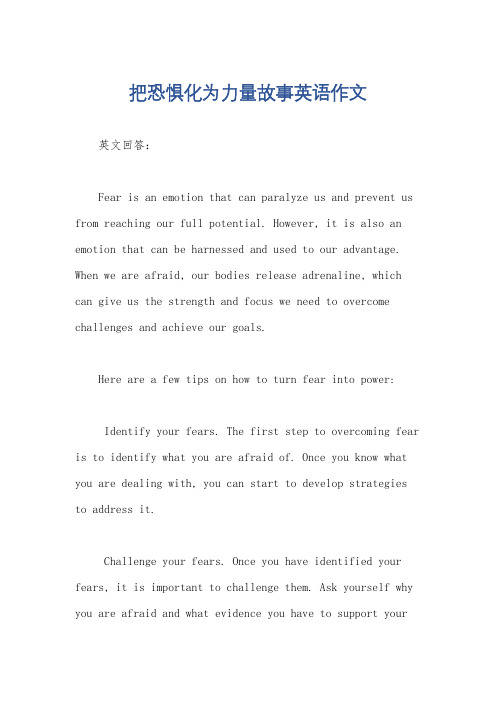
把恐惧化为力量故事英语作文英文回答:Fear is an emotion that can paralyze us and prevent us from reaching our full potential. However, it is also an emotion that can be harnessed and used to our advantage. When we are afraid, our bodies release adrenaline, which can give us the strength and focus we need to overcome challenges and achieve our goals.Here are a few tips on how to turn fear into power:Identify your fears. The first step to overcoming fear is to identify what you are afraid of. Once you know what you are dealing with, you can start to develop strategies to address it.Challenge your fears. Once you have identified your fears, it is important to challenge them. Ask yourself why you are afraid and what evidence you have to support yourfears. Are your fears based on reality or are they simply the product of your imagination?Take small steps. Don't try to overcome your fears all at once. Start by taking small steps and gradually workyour way up to bigger challenges. This will help you build confidence and make the process less daunting.Find a support system. Having a support system of friends, family, or colleagues can help you stay motivated and accountable. Share your fears with them and ask fortheir support.Reward yourself. When you overcome a fear, it is important to reward yourself. This will help you stay motivated and make the process more enjoyable.Turning fear into power is not easy, but it is possible. By following these tips, you can learn to harness your fear and use it to achieve your goals.中文回答:恐惧是一种能够让我们瘫痪并且无法发挥全部潜能的情绪。
从恐惧中获得成功——TED英语演讲稿:Whatfearcanteachus
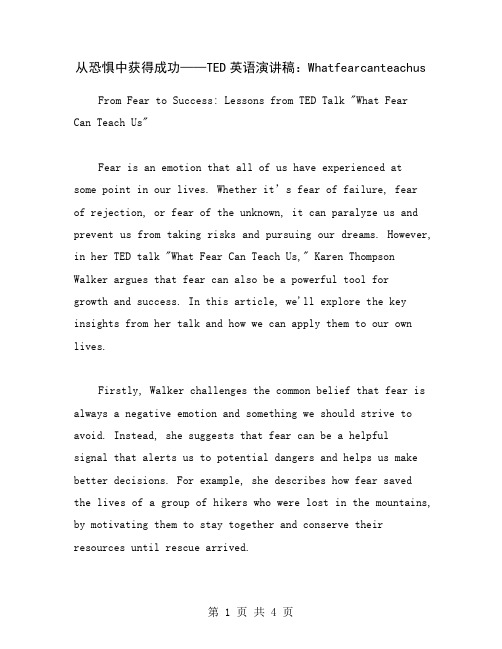
从恐惧中获得成功——TED英语演讲稿:Whatfearcanteachus From Fear to Success: Lessons from TED Talk "What FearCan Teach Us"Fear is an emotion that all of us have experienced at some point in our lives. Whether it’s fear of failure, fearof rejection, or fear of the unknown, it can paralyze us and prevent us from taking risks and pursuing our dreams. However, in her TED talk "What Fear Can Teach Us," Karen Thompson Walker argues that fear can also be a powerful tool forgrowth and success. In this article, we'll explore the key insights from her talk and how we can apply them to our own lives.Firstly, Walker challenges the common belief that fear is always a negative emotion and something we should strive to avoid. Instead, she suggests that fear can be a helpfulsignal that alerts us to potential dangers and helps us make better decisions. For example, she describes how fear savedthe lives of a group of hikers who were lost in the mountains, by motivating them to stay together and conserve their resources until rescue arrived.Moreover, fear can also be a useful source of motivation. Walker suggests that fear of failure, for instance, can push us to work harder and be more creative in finding solutionsto problems. She shares the story of J.K. Rowling, who was rejected by multiple publishers before finally finding success with the Harry Potter series. Rowling notes that her fear of failure and poverty was a powerful motivator to keep writing and refining her work.Another important point that Walker emphasizes is that fear is often closely connected to our imagination. We tendto imagine worst-case scenarios and catastrophize the future, which can make our fears seem more overwhelming and paralyzing. However, by reframing our fears in a morepositive light, we can harness the power of our imaginationto envision a successful outcome. For example, instead of focusing on the fear of public speaking, we can visualize a successful presentation that impresses our audience.Walker also suggests that fear can be a valuable source of insight and self-knowledge. By examining our fears and the underlying beliefs and assumptions that drive them, we can gain a deeper understanding of ourselves and our values. For example, fear of rejection may reveal a deep-seated need forapproval or validation from others, which can help usidentify areas for personal growth and development.Ultimately, as Walker concludes, fear is not something to be conquered or eliminated, but rather a part of the human experience that we can learn from and use to our advantage.By embracing our fears and using them as motivation, guidance, and self-knowledge, we can learn to navigate theuncertainties and challenges of life with greater courage and resilience. As she puts it, "fear is a kind of ghost story we tell ourselves, but like any good ghost story, it's also a doorway into a deeper, more meaningful understanding of whowe are."In conclusion, fear is not always something to be feared. It can be a powerful tool that helps us to grow and succeed. Rather than trying to avoid or suppress our fears, we canlearn from them and use them to guide our decisions, motivate us to work harder, and develop a deeper understanding of ourselves. Karen Thompson Walker's TED Talk "What Fear Can Teach Us" offers valuable insights and advice on how to dojust that. So, if you're feeling scared or stuck, take a deep breath and remember that your fear can be your greatest ally on the path to success.。
如何看待恐惧,让它成为内在动力?——TED英语演讲稿:Whatfearcanteachus
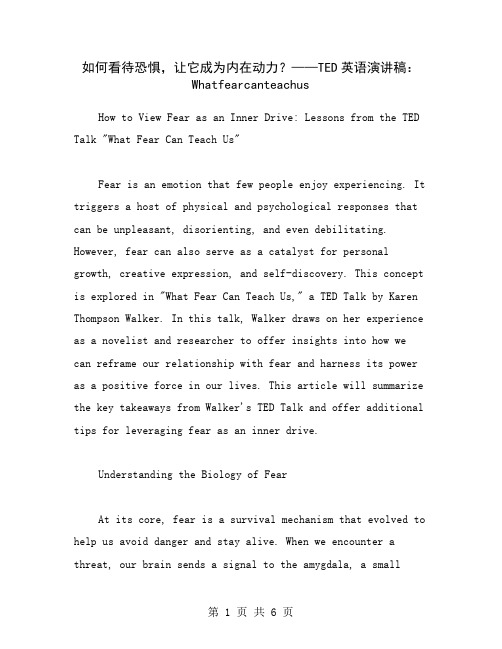
如何看待恐惧,让它成为内在动力?——TED英语演讲稿:WhatfearcanteachusHow to View Fear as an Inner Drive: Lessons from the TED Talk "What Fear Can Teach Us"Fear is an emotion that few people enjoy experiencing. It triggers a host of physical and psychological responses that can be unpleasant, disorienting, and even debilitating. However, fear can also serve as a catalyst for personal growth, creative expression, and self-discovery. This concept is explored in "What Fear Can Teach Us," a TED Talk by Karen Thompson Walker. In this talk, Walker draws on her experience as a novelist and researcher to offer insights into how we can reframe our relationship with fear and harness its power as a positive force in our lives. This article will summarize the key takeaways from Walker's TED Talk and offer additional tips for leveraging fear as an inner drive.Understanding the Biology of FearAt its core, fear is a survival mechanism that evolved to help us avoid danger and stay alive. When we encounter a threat, our brain sends a signal to the amygdala, a smallalmond-shaped structure in the limbic system that processes emotions. The amygdala triggers a cascade of neurochemical changes that prepare our bodies to fight, flee, or freeze. The sympathetic nervous system releases adrenaline, cortisol, and other stress hormones that increase heart rate, blood pressure, and muscle tension. The parasympathetic nervous system, which regulates relaxation and digestion, shuts down non-essential functions to conserve energy. This is why fear can cause physical symptoms like sweating, trembling, nausea, and shortness of breath.Walker notes that the same physiological response that occurs in the presence of danger can also occur in the presence of uncertainty or novelty. "Fear is not just a response to danger, but also to the possibility of danger," she says. This means that even if we are not facing an immediate threat, we may still feel fearful when we encounter something new, unfamiliar, or unpredictable. Examples of this could include starting a new job, moving to a different city, or speaking in public. These situations can trigger what Walker calls "the feeling of dread that accompanies a future, uncertain threat."Reframing Fear as a Positive ForceWhile fear can be an unpleasant experience, Walker argues that it can also be a source of inspiration, creativity, and resilience. She draws on examples from literature, such as "Moby Dick" and "Lord of the Flies," to illustrate how fear can motivate characters to confront their fears, overcome adversity, and discover their inner strength. Through storytelling, she shows how fear can become a transformative force that leads to growth and self-discovery. "The stories we tell about fear can also alter the way we experience it," she says. "They can make it less of a burden and more of a gift."To reframe fear in this way, Walker suggests using imagination as a tool for transformation. By visualizing different outcomes and scenarios, we can reframe our fears as opportunities for growth and learning. For example, if we are afraid of public speaking, we can imagine ourselvesdelivering a successful speech to a supportive audience. If we are afraid of failure, we can imagine the lessons we might learn and the resilience we might gain from setbacks. By creating these mental simulations, we can change our emotional response to fear and see it as a challenge to be embraced rather than an obstacle to be avoided.Another technique that Walker recommends is to seek out moments of awe and wonder to counterbalance fear. Awe is defined as "an emotional response to something vast, incomprehensible, and beyond our everyday experience." By exposing ourselves to awe-inspiring experiences, such as watching a beautiful sunset or visiting a majestic mountain range, we can shift our focus away from our fears and towards a sense of wonder and appreciation for the world around us. This can help us put our anxieties into perspective and recognize that they are just one small part of a larger and more mysterious universe.Tips for Using Fear as an Inner DriveIn addition to the insights from Karen Thompson Walker, there are several other strategies that we can use to view fear as an inner drive and harness its power to achieve our goals. These include:1. Cultivating a growth mindset - When we embrace the idea that our abilities are not fixed but can be developed with effort and persistence, we are more likely to seechallenges as opportunities for growth rather than threats to our self-worth.2. Practicing mindfulness - By learning to observe our thoughts and emotions without judgment, we can develop greater self-awareness and reduce the impact of fear on our behavior.3. Setting realistic goals - If we set goals that are challenging but achievable, we can use fear as a motivator to push ourselves to reach our full potential.4. Maintaining social support - By seeking out the encouragement and guidance of trusted friends and mentors, we can feel less alone in our fears and gain valuable perspective and advice.ConclusionFear can be a powerful force in our lives, but it is up to us to decide how we will respond to it. By viewing fear as an inner drive and reframing it as a positive force for growth and self-discovery, we can transform our relationship with this emotion and use it to achieve our goals. Whetherthrough visualization, awe, or other strategies, we can learn to embrace fear and harness its power to live more fulfilling and inspiring lives.。
对抗恐惧,走向成功:Whatfearcanteachus演讲稿
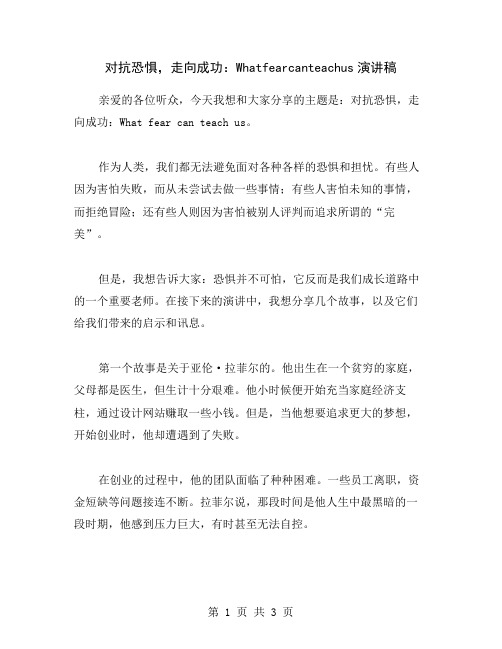
对抗恐惧,走向成功:Whatfearcanteachus演讲稿亲爱的各位听众,今天我想和大家分享的主题是:对抗恐惧,走向成功:What fear can teach us。
作为人类,我们都无法避免面对各种各样的恐惧和担忧。
有些人因为害怕失败,而从未尝试去做一些事情;有些人害怕未知的事情,而拒绝冒险;还有些人则因为害怕被别人评判而追求所谓的“完美”。
但是,我想告诉大家:恐惧并不可怕,它反而是我们成长道路中的一个重要老师。
在接下来的演讲中,我想分享几个故事,以及它们给我们带来的启示和讯息。
第一个故事是关于亚伦·拉菲尔的。
他出生在一个贫穷的家庭,父母都是医生,但生计十分艰难。
他小时候便开始充当家庭经济支柱,通过设计网站赚取一些小钱。
但是,当他想要追求更大的梦想,开始创业时,他却遭遇到了失败。
在创业的过程中,他的团队面临了种种困难。
一些员工离职,资金短缺等问题接连不断。
拉菲尔说,那段时间是他人生中最黑暗的一段时期,他感到压力巨大,有时甚至无法自控。
但是,正是在这段困难的时间里,他从恐惧中汲取到了勇气和坚韧。
他学会了如何面对挫折,并从中吸取经验,不断尝试新的方法,终于创业成功,成为了一名成功的创业者。
从这个故事中,我们可以看到:恐惧并不是一件坏事。
它能够让我们更加珍惜机会,并发掘自身的潜力。
第二个故事是关于史蒂夫·乔布斯的。
当他在年轻时,创办了苹果公司,并在接下来的几年中推出了许多令人兴奋的产品。
但是,在1985年,他却被苹果公司开除了。
乔布斯的心情非常沮丧和绝望,他感到自己一无所有。
但是,这种危机却促使他重新审视自己的人生和目标在接下来的几年中,他成立了新的公司,并开创了全新的市场领域。
如今,苹果公司已经成为了全球最为成功的公司之一,而乔布斯也成为了商界和创新界的传奇人物。
从这个故事中,我们可以看到:恐惧可以推动我们前行,让我们更敢于尝试,更大胆地去创造自己的未来。
最后一个故事,是关于玛丽·居里的。
如何利用恐惧来提高自我认知?——TED英语演讲稿:Whatfearcanteachus

如何利用恐惧来提高自我认知?——TED英语演讲稿:WhatfearcanteachusWhat fear can teach us: How to use fear to enhance self-awarenessFear is an incredibly powerful emotion that is often seen as negative and even overwhelming. However, when we learn to harness the energy of fear, it can help us to grow and become more self-aware. In this TED talk, we will explore how fear can teach us valuable lessons about ourselves, our beliefs, and our values.The first step in harnessing the power of fear is to recognize it. Fear can manifest in many different ways: anxiety, panic, restlessness, or even anger. Once we have identified our specific fears, we can begin to understand why we feel this way. Fear can be a warning sign to us that something is not right and needs to be addressed. For example, if we are afraid of speaking in public, it may be because we lack the necessary skills or confidence to do so. Byidentifying the fear, we can take steps to overcome it, suchas enrolling in a public speaking course or joining a local Toastmasters club.The second step in using fear to enhance self-awarenessis to examine our beliefs and values. Fear can often be triggered by something that threatens our core beliefs or values. For example, if we are afraid of rejection, it may be because we believe that we are not good enough or that we do not deserve love. By identifying these beliefs, we can challenge them and learn to see things from a new perspective. Perhaps we are not as flawed as we thought, or maybe we needto re-evaluate our values to align them more closely with our authentic selves.The third step in using fear to enhance self-awareness is to learn from it. Fear can provide us with valuable feedback about ourselves and our experiences. If we are afraid of failure, for example, we may need to examine our goals and expectations to see if they are realistic. We may also needto develop resilience and learn from our mistakes so that we can adapt and move forward. Similarly, if we are fearful of change, it may be because we are stuck in old habits and routines that are holding us back. By embracing change, wecan open ourselves up to new opportunities and possibilities.In conclusion, fear can be a powerful tool for enhancing self-awareness and personal growth. By recognizing our fears, examining our beliefs and values, and learning from our experiences, we can use fear to overcome obstacles, develop resilience, and become more authentic and self-aware individuals. Remember, fear is not something to be feared; it is something to be embraced and understood. As the ancient Chinese philosopher Confucius once said, "The cautious seldom err." So, let us learn from our fears and move forward with confidence and clarity, knowing that we have the power to overcome any obstacle that comes our way.。
最新-TED英语演讲稿What fear can teach us恐惧可以教会我们什么 精品
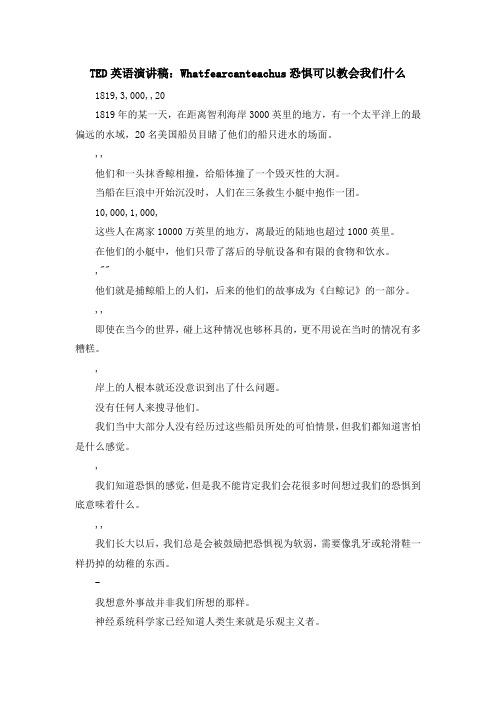
TED英语演讲稿:Whatfearcanteachus恐惧可以教会我们什么1819,3,000,,201819年的某一天,在距离智利海岸3000英里的地方,有一个太平洋上的最偏远的水域,20名美国船员目睹了他们的船只进水的场面。
,,他们和一头抹香鲸相撞,给船体撞了一个毁灭性的大洞。
当船在巨浪中开始沉没时,人们在三条救生小艇中抱作一团。
10,000,1,000,这些人在离家10000万英里的地方,离最近的陆地也超过1000英里。
在他们的小艇中,他们只带了落后的导航设备和有限的食物和饮水。
,""他们就是捕鲸船上的人们,后来的他们的故事成为《白鲸记》的一部分。
,,即使在当今的世界,碰上这种情况也够杯具的,更不用说在当时的情况有多糟糕。
,岸上的人根本就还没意识到出了什么问题。
没有任何人来搜寻他们。
我们当中大部分人没有经历过这些船员所处的可怕情景,但我们都知道害怕是什么感觉。
,我们知道恐惧的感觉,但是我不能肯定我们会花很多时间想过我们的恐惧到底意味着什么。
,,我们长大以后,我们总是会被鼓励把恐惧视为软弱,需要像乳牙或轮滑鞋一样扔掉的幼稚的东西。
-我想意外事故并非我们所想的那样。
神经系统科学家已经知道人类生来就是乐观主义者。
,,",""",这也许就是为什么我们认为有时候恐惧,本身就是一种危险或带来危险。
不要愁。
我们总是对别人说。
不要慌。
英语中,恐惧是我们需要征服的东西。
是我们必须对抗的东西,是我们必须克服的东西。
?,?但是我们如果换个视角看恐惧会如何呢?如果我们把恐惧当做是想象力的一个惊人成果,是和我们讲故事一样精妙而有见地的东西,又会如何呢?,在小孩子当中,我们最容易看到恐惧与想象之间的联系,他们的恐惧经常是超级生动的。
,,,,,,我小时候住在加利福尼亚,你们都知道,是非常适合居住的位置,但是对一个小孩来说,加利福尼亚也会有点吓人。
,,我记得每次小地震的时候当我看到我们餐桌上的吊灯晃来晃去的时候是多么的吓人,我经常会彻夜难眠,担心大地震会在我们睡觉的时候突然袭来。
恐惧的积极作用英语作文

恐惧的积极作用英语作文Fear, an emotion that is often regarded as a hindrance, can actually serve as a catalyst for personal growth and development. While it is true that excessive fear can be paralyzing, a healthy dose of fear can be beneficial in several ways. Here is an exploration of the positive aspects of fear and how it can contribute to a more enriched life experience.1. Fear as a Motivator for PreparednessFear can motivate us to prepare for potential dangers or challenges. For instance, the fear of failure can push individuals to work harder and be more thorough in their endeavors. This preparation can lead to better outcomes and a greater sense of accomplishment.2. Fear and Risk AssessmentFear plays a crucial role in our ability to assess risks. It helps us to be cautious and consider the consequences of our actions. This ability to evaluate potential threats is essential for survival and is a key factor in decision-making processes.3. Fear as a Source of InspirationMany people channel their fear into creative outlets, usingit as a source of inspiration. Artists, writers, and musicians often tap into their fears to create profound and powerful works that resonate with audiences on a deep emotional level.4. Fear and Personal GrowthFacing and overcoming fears can lead to significant personal growth. Each time we confront a fear, we build resilience and self-confidence. This can lead to a stronger sense of self and an increased ability to handle future challenges.5. Fear and Social CohesionFear can also serve as a unifying force within communities. Shared fears or threats can bring people together, fostering a sense of solidarity and cooperation. This social cohesion can be a powerful tool for collective action and problem-solving.6. Fear and the Pursuit of KnowledgeThe fear of the unknown can drive us to seek knowledge and understanding. This curiosity can lead to scientific discoveries, technological advancements, and a broader comprehension of the world around us.7. Fear and the Preservation of ResourcesFear of scarcity can encourage conservation and sustainable practices. By recognizing the potential depletion ofresources, we are prompted to find ways to use and preserve them more effectively.In conclusion, while fear is often seen as a negative emotion, it can have a positive impact on our lives when managed correctly. It can serve as a powerful motivator, a tool forrisk assessment, a source of inspiration, a catalyst for personal growth, a means of social cohesion, a driver for the pursuit of knowledge, and a prompt for the preservation of resources. Embracing fear in a healthy way can lead to a more proactive and fulfilling life.。
- 1、下载文档前请自行甄别文档内容的完整性,平台不提供额外的编辑、内容补充、找答案等附加服务。
- 2、"仅部分预览"的文档,不可在线预览部分如存在完整性等问题,可反馈申请退款(可完整预览的文档不适用该条件!)。
- 3、如文档侵犯您的权益,请联系客服反馈,我们会尽快为您处理(人工客服工作时间:9:00-18:30)。
恐惧可以教会我们什么英语演讲稿 One day in 1819, 3,000 miles off the coast of Chile, in one of the most remote regions of the Pacific Ocean, 20 American sailors watched their ship flood with seawater. 1819 年的某一天, 在距离智利海岸 3000 英里的地方, 有一个太平洋上的 最偏远的水域, 20 名美国船员目睹了他们的船只进水的场面。
They'd been struck by a sperm whale, which had ripped a catastrophic hole in the ship's hull. As their ship began to sink beneath the swells, the men huddled together in three small whaleboats. 他们和一头抹香鲸相撞, 给船体撞了 一个毁灭性的大洞。
当船在巨浪中开 始沉没时, 人们在三条救生小艇中抱作一团。
These men were 10,000 miles from home, more than 1,000 miles from the nearest scrap of land. In their small boats, they carried only rudimentary navigational equipment and limited supplies of food and water. 这些人在离家 10000 万英里的地方, 离最近的陆地也超过 1000 英里。
在 他们的小艇中,他们只带了 落后的导航设备 和有限的食物和饮水。
These were the men of the whaleship Essex, whose story would later inspire parts of "Moby Dick." 他们就是捕鲸船 ESSEX 上的人们, 后来的他们的故事成为《白鲸记》的一 部分。
Even in today's world, their situation would be really dire, but think about how much worse it would have been then. 即使在当今的世界, 碰上这种情况也够杯具的, 更不用说在当时的情况有多 糟糕。
No one on land had any idea that anything had gone wrong. No search party was coming to look for these men. So most of us have never experienced a situation as frightening as the one in which these sailors found themselves, but we all know what it's like to be afraid. 岸上的人根本就还没意识到出了什么问题。
没有任何人来搜寻他们。
我们 当中大部分人没有经历过 这些船员所处的可怕情景, 但我们都知道害怕是什么 感觉。
We know how fear feels, but I'm not sure we spend enough time thinking about what our fears mean. 我们知道恐惧的感觉, 但是我不能肯定我们会花很多时间想过 我们的恐惧
1/6
到底意味着什么。
As we grow up, we're often encouraged to think of fear as a weakness, just another childish thing to discard like baby teeth or roller skates. 我们长大以后,我们总是会被鼓励把恐惧 视为软弱,需要像乳牙或轮滑鞋 一样 扔掉的幼稚的东西。
And I think it's no accident that we think this way. Neuroscientists have actually shown that human beings are hard-wired to be optimists. 我想意外事故并非我们所想的那样。
神经系统科学家已经知道人类 生来就 是乐观主义者。
So maybe that's why we think of fear, sometimes, as a danger in and of itself. "Don't worry," we like to say to one another. "Don't panic." In English, fear is something we conquer. It's something we fight. 这也许就是为什么我们认为有时候恐惧, 本身就是一种危险或带来危险。
“不要愁。
”我们总是对别人说。
“不要慌”。
英语中,恐惧是我们需要征服 的东西。
是我们必须对抗的东西,是我们必须克服的东西。
It's something we overcome. But what if we looked at fear in a fresh way? What if we thought of fear as an amazing act of the imagination, something that can be as profound and insightful as storytelling itself? 但是我们如果换个视角看恐惧会如何呢 ? 如果我们把恐惧当做是想象力的 一个惊人成果, 是和我们讲故事一样 精妙而有见地的东西,又会如何呢? It's easiest to see this link between fear and the imagination in young children, whose fears are often extraordinarily vivid. 在小孩子当中,我们最容易看到恐惧与想象之间的联系, 他们的恐惧经常 是超级生动的。
When I was a child, I lived in California, which is, you know, mostly a very nice place to live, but for me as a child, California could also be a little scary. 我小时候住在加利福尼亚, 你们都知道,是非常适合居住的位置, 但是对 一个小孩来说,加利福尼亚也会有点吓人。
I remember how frightening it was to see the chandelier that hung above our dining table swing back and forth during every minor earthquake, and I sometimes couldn't sleep at night, terrified that the Big One might strike while we were sleeping. 我记得每次小地震的时候 当我看到我们餐桌上的吊灯 晃来晃去的时候是 多么的吓人, 我经常会彻夜难眠,担心大地震 会在我们睡觉的时候突然袭来。
2/6
And what we say about kids who have fears like that is that they have a vivid imagination. But at a certain point, most of us learn to leave these kinds of visions behind and grow up. 我们说小孩子感受到这种恐惧 是因为他们有生动的想象力。
但是在某个时 候,我们大多数学会了 抛弃这种想法而变得成熟。
We learn that there are no monsters hiding under the bed, and not every earthquake brings buildings down. But maybe it's no coincidence that some of our most creative minds fail to leave these kinds of fears behind as adults. 我们都知道床下没有魔鬼, 也不是每个地震都会震垮房子。
但是我们当中 最有想象力的人们 并没有因为成年而抛弃这种恐惧,这也许并不是巧合。
3/6
4/6
5/6
6/6
。
